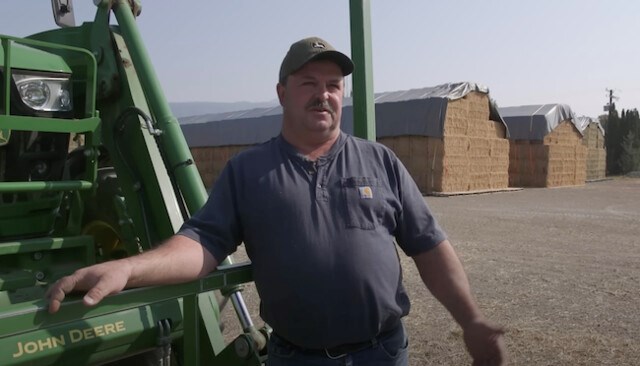Drought conditions in the North Okanagan are becoming a political football.
Following a fish protection order placed on the Salmon River on Aug. 16, forage crop farmers in the Westwold area are crying foul.
"People need to wake up ... their food doesn't come from a supermarket, it all starts right here," farmer Russel Clemiston says in a video documentary.
The order comes as water levels reach critical lows.
It doesn't affect water pulled from the river for personal, market vegetable or livestock use – but forage crop growers were ordered to turn off the taps completely.
"We depend on forage to feed our cattle, we're not doing it for fun," Clemiston said.
Some have been defying the order, and resource officers have been going from farm to farm to enforce it.
The matter has caught the eye of the opposition BC United Party.
Leader Kevin Falcon will be joined by Interior MLAs Greg Kyllo, Todd, Stone, Peter Milobar, and Lorne Doerksen at meeting on the irrigation issue, Saturday at the Westwold Community Hall, beginning at 9 a.m.
Trudy Schweb said the protection order "is having a devastating impact on so many trying to keep our livelihoods profitable."
She's fighting to continue watering forage for her 350-plus head of cattle this winter.
"There are currently door-to-door irrigation restrictions being enforced with the threat of tickets and $500-plus fines," John Pedosuk said in an email.
He said farmers are having wells shut down, not just river water access.
"Farmers chose to ignore the order until they were physically forced to comply under threat of tickets and fines," said Pedosuk.
He called the exemption for vegetable growers "discrimination."
In a livestreamed update on the provincial wildfire and drought situation, Minister of Forest Bruce Ralston said the four targeted protection orders in place in the province are a necessary response to "completely unprecedented" conditions.
Ralston said short-term rains may provide some relief but won't be "big enough, significant enough to change the trajectory of ongoing drought conditions in the province."
He expects them to "slowly get worse in many watersheds."
Raltson said several inches of rain over an extended period will be necessary to change the situation, which is expected to persist into the fall.
He said the orders were brought in as a "last resort" and he understands the "very real impact on farmers."
More orders may be necessary if things don't change.
The minister said the province has been in discussion with the federal government on disaster impact funding for affected farmers.
In the Westwold documentary, alfalfa farmer Eric Buff says if he hadn't watered just before the order came down, he would have lost 20% of his crop, which feeds dairy cattle in the Fraser Valley.
Hay grower Clay Abel said he complied with a voluntary 50% water use reduction before the order to cease watering, but say he needs to continue to get the next crop started.
"This our living," he said.
Abel said the river is always low this time of year and that "salmon will sit in Shuswap Lake until it's high enough they can come up and spawn."
"We've got to protect the food chain. We produce the feed that dairy cow eats that produces that jug of milk ... cheese on your hamburger. It all starts right here."
More than 80 per cent of the province has reached Level 4 or 5 drought conditions, the highest possible rankings, after months of little or no rain.




